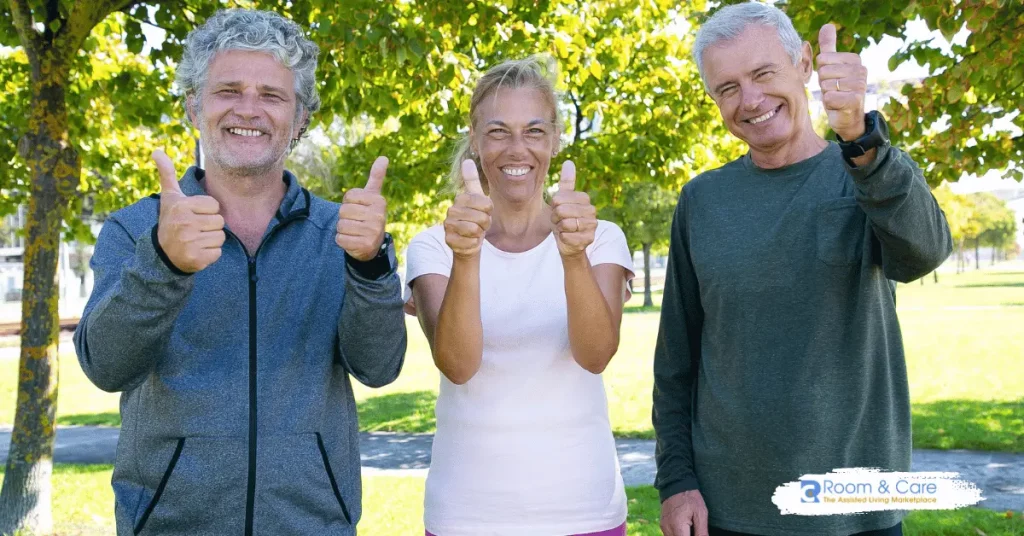

Optimism and health are deeply connected, especially for seniors. Research shows that a positive mindset can lead to a longer, healthier life by enhancing physical health, boosting mental well-being, and fostering strong social connections. With the right outlook, seniors can improve their quality of life and enjoy more meaningful years. This article explores how optimism directly impacts health, offering practical tips and strategies for seniors to cultivate a positive mindset and navigate challenges with resilience. Whether you’re a senior or caring for an older adult, these insights can make a transformative difference.
Optimism goes beyond “looking on the bright side”—it’s a powerful approach to life that can have real benefits for senior health. Let’s dive into the ways a positive outlook can benefit both body and mind.
Studies reveal that optimism can lower stress levels, which significantly impacts heart health, immunity, and overall resilience. Here are some key physical health benefits linked to an optimistic mindset:
Heart Health: According to research from the American Heart Association, optimism is associated with a lower risk of cardiovascular disease. People with a positive outlook are more likely to practice heart-healthy behaviors and manage stress better, which reduces strain on the heart.
Immune System Boost: Optimism strengthens the immune system. Studies show that when we maintain a positive mindset, our body produces more antibodies, which can help seniors fight off illness and recover faster from colds or infections.
Pain Tolerance and Recovery: Seniors with a positive attitude may also have a higher pain tolerance and better recovery outcomes. Research suggests that optimism can reduce the perception of pain, making it easier for seniors to manage chronic conditions or recover from surgeries.
An optimistic outlook can also bolster mental resilience, enhancing cognitive function and reducing the risk of mental health challenges. Key mental health benefits of optimism include:
Reduced Risk of Depression: Optimism can act as a buffer against depression. Seniors who maintain a positive outlook are better equipped to handle life’s ups and downs, reducing their risk of experiencing prolonged sadness or anxiety.
Improved Cognitive Function: Positive thinking stimulates the brain, helping keep cognitive functions sharp. Seniors with an optimistic outlook tend to engage more in mental activities, which strengthens memory, improves focus, and reduces the likelihood of cognitive decline.
Enhanced Coping Skills: Optimistic seniors can cope with life’s challenges—be it health issues, lifestyle changes, or personal loss—more effectively. A positive mindset helps them approach problems as manageable, fostering resilience.
The good news is that optimism isn’t just an inborn trait; it’s a skill that can be nurtured with daily practices and habits. Here’s a guide on how seniors can build optimism:
One of the easiest and most impactful ways to cultivate optimism is by practicing gratitude. Keeping a daily gratitude journal, where you write down three things you’re thankful for each day, shifts your focus away from negativity and encourages appreciation for life’s simple joys.
Physical activity is a natural mood booster, as exercise releases endorphins that help improve your mood. Even light activities like walking, stretching, or yoga can make a noticeable difference in how you feel.
Being around positive, supportive people can have a profound effect on your outlook. Social interactions boost mental health, provide emotional support, and foster a sense of belonging.
Setting achievable goals—whether they’re related to health, hobbies, or personal interests—provides a sense of purpose and accomplishment. These goals keep seniors engaged and motivated, promoting a positive outlook on life.
Constant exposure to negative media can impact mental health and lead to anxiety. It’s important to stay informed but equally important to balance it with uplifting content.
Mindfulness helps seniors focus on the present, reducing anxiety and fostering peace of mind. Meditation is another effective practice for building optimism by encouraging calm and reducing stress.

Creating an environment that promotes optimism can also positively impact senior health. When evaluating senior living options, certain factors can enhance a positive, supportive atmosphere.
Staying engaged is essential for fostering optimism. Consider choosing a living environment that provides a variety of activities such as exercise classes, book clubs, art workshops, and group outings.
Many senior living communities now include wellness programs that emphasize physical and mental health. These programs provide exercise sessions, mental health support, and nutrition guidance to help residents stay healthy and happy.
A warm, compassionate staff can make a tremendous difference in a senior’s experience. The staff’s attitude and approach to care contribute to a positive living environment, helping seniors feel valued, safe, and supported.
At Room and Care, we understand the importance of finding a positive and supportive living environment. Our platform helps seniors and their families explore top-rated assisted living facilities, memory care communities, and adult family homes, all with the assurance of direct access and no middlemen. This means you can focus on finding the best options for well-being without added costs.
Life’s challenges don’t disappear with age, but an optimistic outlook can empower seniors to face these challenges with resilience. Here are ways optimism can help seniors navigate common obstacles:
Health changes are a natural part of aging. Seniors may experience challenges like reduced mobility or chronic conditions, which can impact daily life. Optimism can help them focus on what they can do rather than what they can’t, creating a more adaptive approach to health.
Moving to a new home, losing a loved one, or adjusting to retirement can be difficult transitions. An optimistic outlook allows seniors to see these changes as opportunities for new experiences, growth, or reflection.
Seniors may experience setbacks, whether health-related or personal. Optimism encourages a solution-focused mindset, helping seniors approach setbacks as temporary rather than permanent challenges.

Optimism can be a transformative tool for seniors. Here are answers to some frequently asked questions about optimism and health:
How does optimism affect lifespan?
Studies show that optimists live longer, with one Harvard study indicating that seniors with a positive outlook could live up to 15% longer than their less optimistic peers. A positive mindset contributes to physical and mental well-being, which in turn supports longevity.
Can optimism help with mental decline?
Yes, optimism is linked to sharper cognitive function. Engaging in positive thinking, mental exercises, and social activities can stimulate brain health and delay cognitive decline.
Is optimism a skill that can be learned?
Absolutely. While some people may be naturally optimistic, everyone can cultivate positivity through daily practices like gratitude, mindfulness, and engaging in activities that bring joy.
What if I’m not naturally optimistic?
If you find it hard to stay positive, don’t worry. Start with small steps, like expressing gratitude or focusing on positive self-talk. Over time, these practices can shift your mindset.
Family members and caregivers play a crucial role in fostering optimism for seniors. By encouraging positive thinking and promoting an optimistic environment, loved ones can help seniors maintain a positive outlook. Here’s how caregivers and family members can support:
Room and Care offers families a way to find supportive, engaging communities that can help seniors lead a positive, healthy lifestyle. By focusing on environments that nurture optimism, we aim to provide peace of mind for both seniors and their loved ones.
Optimism and health go hand-in-hand, with a positive outlook offering substantial benefits for physical, mental, and emotional well-being. By fostering positivity through gratitude, physical activity, social connection, and mindful practices, seniors can navigate life’s challenges with resilience and joy.
Whether you’re a senior or a caregiver, remember that optimism is a powerful tool for enhancing quality of life. Explore supportive environments and resources that encourage a healthy mindset. For those considering senior living options, Room and Care is here to help you find the right fit, from assisted living to memory care and independent living communities. Embrace optimism—it’s never too late to make a positive impact on your health and well-being.